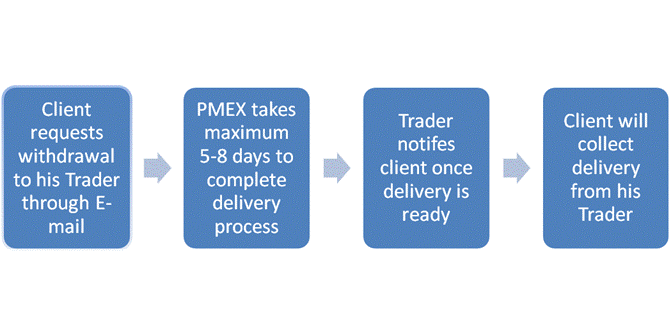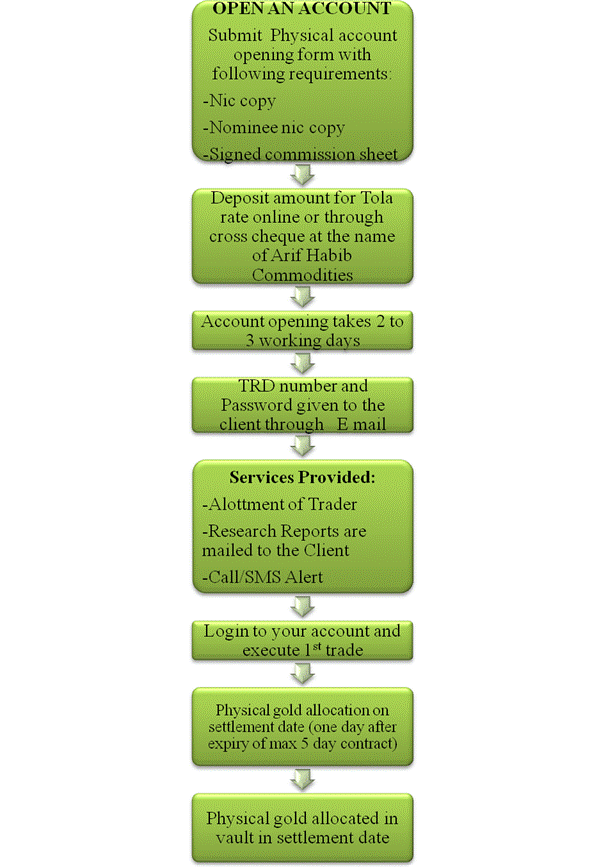WHY COMMODITIES |
|
|
|
|
|
|
|
|
|
|
|
|
|
|
|
|
|
WHY ARIF HABIB COMMODITIES |
|
|
|
|
|
|
|
|
|
|
|
|
|
|
|
|
|
|
|
|
|
|
1. LIMIT ORDERS:
Limit order is used to buy or sell a commodity at a maximum or minimum limit set by the trader. This ensures that the trader will not pay more or less for the set price. As the market price reaches the sell limit price or higher, the position will be executed at the sell limit price. Similarly, as the market price reaches the buy limit price or lower, the position will be executed at the buy limit price. If GTC is unchecked then the order is cancelled at the end of the day.
2. STOP LOSS MARKET ORDER:
It is an order positioned with a broker to buy or sell once the stock reaches a certain price. A stop-loss is designed to limit an investor's loss on a security position. The main advantage is that you don't have to monitor every day. If GTC is unchecked then the order is cancelled at the end of the day.
3. MARKET ORDERS:
Market Order enables the trader to buy or sell immediately at the best available current market price.
4. RSI (Relative Strength Index)
A technical indicator that compares the scale of recent increase to recent decrease to find out overbought, oversold and neutral situation of a commodity.
5. CONTRACTS:
Different commodity products available for trade
6. BID:
Price offered by buyer
7. NET LIQUIDITY:
Net liquidity is the cash balance available
8. REALIZED PROFIT/LOSS:
Profit/Loss that has been booked at the time when trade is closed
9.UNREALIZED PROFIT/LOSS:
Profit/Loss that has not been booked at the time when trade is closed
GOLD WITHDRAWAL PROCESS


TIPS FOR SUCCESSFUL TRADING FOR INVESTORS:
- -For an investor it is important to stay up to date on economic movements and its impact on the commodities.
- -Monitor news regarding financial activities happening all around the globe. It’s important to understand what’s affecting the global business and through news one can keep himself updated.
- -Consider using advanced techniques like fundamental and technical analysis to increase your knowledge of the commodity.
- -To become a successful trader use advanced strategies which will help you to experience greater returns.
- -The most experienced player thinks twice before making the next move so think and research first before making the next move to play safe.
TRADING TERMINOLOGIES
Bid: bid only refers to the price a market maker will pay for a security; it's the price an investor would receive if selling the security.
Ask: also called the offer, this is the price an investor would pay when buying the security.
Spread: the difference between the bid and the ask price
Trade date: The trade is the date on which a security trade actually takes place.
Settlement date: this is the date by which the securities trade must be completed.
Good-till-cancelled (GTC): an order that remains in effect until it is executed or the investor decides to cancel it. If the order does not have an instruction, the order expires at the end of the day on which it was placed. GTC orders typically are cancelled by the broker-dealer after 30 to 90 days.
Short sale: refers to selling shares borrowed from the broker-dealer. If the price drops, the investor then buys the shares at a lower price and returns them to the broker-dealer
Lot: A lot is the standard unit size of a transaction. It represents the minimum quantity which can be traded in any given instrument.
Closing Price (or range) |
: |
The price (or price range) recorded during the period designated by the exchange as the official close. |
Broker: A company or individual that executes futures and options orders on behalf of financial and commercial institutions and/or the general public
Bull Market (Bull/Bullish): A market in which prices are rising. A market participant who believes prices will move higher is called a “bull.”A news item is considered bullish if it is expected to result in higher prices.
Bear Market (Bear/Bearish): A market in which prices are declining. A market participant who believes prices will move lower is called a “bear.”A news item is considered bearish if it is expected to result in lower prices.
Commission: A fee charged by a broker to a customer for executing a transaction.
Day Order: An order that if not executed expires automatically at the end of the trading session on the day it was entered.
Day Trader: A speculator who will normally initiate and offset a position within a single trading session.
Futures Contract: A legally binding agreement to buy or sell a commodity or financial instrument at a later date. Futures contracts are normally standardized according to the quality, quantity, delivery time and location for each commodity, with price as the only variable.
Hedging: The practice of offsetting the price risk inherent in any cash market position by taking an opposite position in the futures market
Leverage: The ability to control large dollar amounts of a commodity with a comparatively small amount of capital.
Margin Call: A call from a clearinghouse to a clearing member, or from a broker or firm to a customer, to bring margin deposits up to a required minimum level.
Market Order: An order to buy or sell a futures or options contract at whatever price is obtainable when the order reaches the trading floor.
Net Asset Value: The value of each unit of participation in a commodity pool.
Net Performance: An increase or decrease in net asset value exclusive of additions, withdrawals and redemptions.
Offer: An indication of willingness to sell a futures contract at a given price; the opposite of Bid.
Technical Analysis: An approach to analysis of futures markets which examines patterns of price change, rates of change, and changes in volume of trading, open interest and other statistical indicators.
See also Charting.
Yield Curve: A graphic representation of market yield for a fixed income security plotted against the maturity of the security.
Yield: A measure of the annual return on an investment.
Aggregation: The policy under which all futures positions owned or controlled by one trader or a group of traders are combined to determine reportable positions and speculative limits. |
Arbitrage: The simultaneous purchase and sale of similar commodities in different markets to take advantage of a price discrepancy. |
Carrying Broker: A member of a futures exchange, usually a clearinghouse member, through which another firm, broker or customer chooses to clear all or some trades. |
Canceling Order: An order that deletes a customer's previous order. |
Closing Range: A range of prices at which buy and sell transactions took place during the close of the market. |
Commission: A fee charged by a broker to a customer for executing a transaction. |
Expiration Date: Generally the last date on which an option may be exercised. It is not uncommon for an option to expire on a specified date during the month prior to the delivery month for the underlying futures contracts.
Forex Market: An over-the-counter market where buyers and sellers conduct foreign exchange business by telephone and other means of communication. Also referred to as foreign exchange market
Fundamental Analysis: A method of anticipating future price movement using supply and demand information.
Quotation: The actual price or the bid or ask price of either cash commodities or futures or options contracts at a particular time.
Range: The difference between the high and low price of a commodity during a given trading session, week, month, and year, etc
Speculator: A market participant who tries to profit from buying and selling futures and options contracts by anticipating future price movements. Speculators assume market price risk and add liquidity and capital to the futures markets. |
Spot: Usually refers to a cash market for a physical commodity where the parties generally expect immediate delivery of the actual commodity. |
Stop-Limit Order: A variation of a stop order in which a trade must be executed at the exact price or better. If the order cannot be executed, it is held until the stated price or better is reached again. |
Stop Order: An order that becomes a market order when the futures contract reaches a particular price level. A sell stop is placed below the market; a buy stop is placed above the market. |
Strike Price: The price at which the buyer of a call (put) option may choose to exercise his right to purchase (sell) the underlying futures contract. Also called Exercise Price. |
Volatility: A measurement of the change in price over a given time period.
